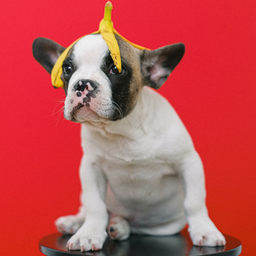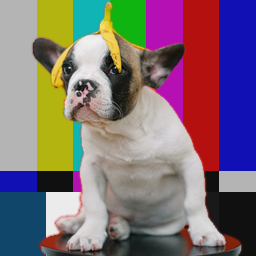Mask Filters¶
Set of filters to manipulate the alpha channel:
AddAlphaPlane adds or replaces an alpha plane.
RemoveAlphaPlane removes an alpha plane.
Mask also replaces an alpha plane but works different than AddAlphaPlane.
ResetMask by default sets all pixel values in the alpha plane to the maximum value.
ColorKeyMask is a simple color keying filter, it sets transparency in the alpha channel in areas where the specified color meets the criteria.
AddAlphaPlane¶
AddAlphaPlane adds an alpha plane to the source clip. It can also be used to
replace the existing alpha plane of the source clip. Note that the color format
changes after using AddAlphaPlane() on an alpha-less format, for example,
RGBP16 becomes RGBAP16.
Syntax and Parameters
AddAlphaPlane (clip, clip mask)
AddAlphaPlane (clip, float mask)
AddAlphaPlane (clip, int mask)
- clip
Source clip; RGB24, RGB32, RGB48, RGB64, and all Planar RGB(A) and YUV(A) formats supported.
- mask
The
maskparameter can be specified in 3 different ways, as a clip, an integer or a float value.The alpha source clip can either be a single channel greyscale (Y) or an alpha capable format (such as RGBAP8 or RGB64). If a clip is supplied, depending on the type, either the greyscale clip or the alpha channel is then copied onto the alpha channel of the source clip. The alpha source clip must be the same bit depth and dimensions as the source clip.
Pixel value in integer or float. If the numeric-type mask parameter is supplied, it will be used as filler value of the resulting alpha plane. No bit depth scaling happens, parameter value is used as-is. For reference, the table below shows all of the maximum values in regards to bit depth.
8-bit
10-bit
12-bit
14-bit
16-bit
32-bit
255
1023
4095
16383
65535
1.0
A value of 0 creates a fully transparent mask (black) and the maximum pixel value creates a completely opaque mask (white). Range for all bit depths is from 0 to the max value. 32-bit Float clips are specified in the range of [0.0 - 1.0]. To set the alpha channel to the maximum value, it's easier to use ResetMask.
RemoveAlphaPlane¶
RemoveAlphaPlane removes the alpha plane from the source clip. Note that the
color format changes after using RemoveAlphaPlane(), for example, YUVA444P8
becomes YUV444P8.
Syntax and Parameters
RemoveAlphaPlane (clip)
- clip
Source clip; RGB32, RGB64, and all Planar RGBA and YUVA formats supported.
Mask¶
Mask replaces the alpha channel in the source clip with a "luma mask"
created from the specified mask clip. Internally the mask clip is converted to
greyscale (ConvertToY(matrix="PC.601")), this result is then used to replace
the alpha plane in the source clip. Note that Mask is a legacy filter, the
intended use was to convert a greyscale RGB clip that consisted of 3 identical
channels to an alpha channel. Using AddAlphaPlane is recommended.
Syntax and Parameters
Mask (clip, clip mask)
- clip
Source clip; RGB32, RGB64, and all Planar RGBA formats supported.
- mask
Mask clip to replace the alpha channel in the source clip. The dimensions and bit depth must be the same as the source clip. The alpha channel in this clip is ignored.
ResetMask¶
ResetMask by default sets all of the pixels in the alpha channel to the maximum value, effectively making it white (completely opaque).
Syntax and Parameters
ResetMask (clip, float "mask")
- clip
Source clip; RGB32, RGB64, and all Planar RGBA and YUVA formats supported.
- mask
Sets the pixel value of the mask channel. By default, it is set to the maximum value of the pixel format. For reference, the table below shows all of the maximum values in regards to bit depth.
8-bit
10-bit
12-bit
14-bit
16-bit
32-bit
255
1023
4095
16383
65535
1.0
A value of 0 creates a fully transparent mask (black) and the maximum pixel value creates a completely opaque mask (white). Range for all bit depths is from 0 to the max value. 32-bit Float clips are specified in the range of [0.0 - 1.0].
ColorKeyMask¶
Clears pixels in the alpha channel by comparing the specified color. Each pixel with a color differing less than the tolerance is set to zero (that is black or transparent), otherwise it is left unchanged. i.e. It is NOT set to opaque (white). To start off with a fully opaque mask, use ResetMask beforehand, this allows an aggregate mask to be constructed with multiple calls to ColorKeyMask to build up transparent areas where each color of interest occurs. To view or extract the mask use ShowAlpha or the Extract filters. See the examples section for more information.
Syntax and Parameters
ColorKeyMask (clip, int color[, int tolB, int tolG, int tolR])
- clip
Source clip; RGB32, RGB64 and all Planar RGBA formats supported.
- color
Specify the color to compare. Color is specified as an RGB value in either hexadecimal or decimal notation. Hex numbers must be preceded with a $. See the colors page for more information on specifying colors.
- tolB, tolG, tolR
Tolerance specifies the range for which close colors are considered the same. The range is from 0 to 255 and the values are autoscaled for bit depths greater than 8 bit. Note that these parameters are unnamed, however they do have a default. When
tolRortolGare not set, they use the value fromtolB. WhentolBis not defined, it defaults to 10.
Note 1: color, tolB, tolG and tolR parameters are unnamed.
Note 2: color and tolerance parameters are the same as for 8 bit RGB32.
Internally they are automatically scaled to the current bit-depth.
Examples¶
AddAlphaPlane
Let's create some colorful text using ColorBars, Subtitle and AddAlphaPlane and then save it to a png:
src = ColorBars(width=256, height=192, pixel_type="RGB32").Crop(0,0,0,-143)
msk = BlankClip(src).Subtitle("AviSynth+", size=55, align=2, text_color=$FFFFFF).ExtractR()
AddAlphaPlane(src, msk)
ImageWriter("colorful text", type="png")

Result¶ |
Now suppose that you made a mask in an image editor and want to load it in AviSynth to use it as an alpha for a clip. The process is similar to the previous example:
src = FFVideoSource(video.mkv)
msk = FFImageSource("mask.png").ExtractR() # see note below
AddAlphaPlane(src, msk)
If the mask was saved as a single channel greycale (Y) image or if the mask is in the alpha channel then ExtractR() is not needed.
ColorKeyMask
Let's use ColorKeyMask to remove the background and then Overlay the result over a ColorBars clip:
src = ImageSource("colorkeymask-dog.png")
base = ColorBars(width=src.Width(), height=src.Height())
ResetMask(src)
ColorKeyMask($F22E42, 25)
ColorKeyMask($DC2026, 25)
ColorKeyMask($B92708, 25)
# MaskTools2: mt_inpand shrinks the mask and mt_deflate feathers the mask outward.
msk = ExtractA().mt_inpand().mt_inflate().mt_inflate()
Overlay(base, src, mask=msk)
# To use Layer instead, comment out Overlay and use the following commands.
# src = AddAlphaPlane(src, msk)
# Layer(base, src)

|

Result¶ |
The result is by no means perfect, but it gives the general idea of how to use the ColorKeyMask filter. There are more intricate ways of improving the result, for example:
Lightly denoising the source clip prior to ColorKeyMask often helps (specially with noisy sources). Scaling the source clip to a lower resolution can also be beneficial. Both methods help reduce variations in the target color, leading to lower tolerance values.
Scaling the source clip to a higher resolution prior to ColorKeyMask can help retain finer details in the mask, like stray hairs or edges.
Using color correction filters to reduce some of the color spill. This sometimes requires multipass masking and layering that target only the troublesome areas.
And then there is MaskTools2 which includes various filters for dealing with masks, as shown in the example above.
It should be noted that ColorKeyMask is a primitive color keying filter, if the end goal is green screen removal (chroma keying), it may not be the best option. There is dedicated software that handle this type of task much better, as discussed in the "Chaining calls to ColorKeyMask" VideoHelp thread.
Changelog¶
Version |
Changes |
|---|---|
AviSynth+ r2487 |
Mask: support RGB64 and all Planar RGBA formats.
ColorKeyMask: support RGB64 and all Planar RGBA formats.
ResetMask: support RGB64 and all Planar RGBA/YUVA formats.
ResetMask: new
mask parameter.New filters: AddAlphaPlane and RemoveAlphaPlane.
|
AviSynth 2.5.8 |
ColorKeyMask: Allow independant tolerance levels for each channel. |
AviSynth 2.0.6 |
Added ResetMask filter. |
AviSynth 2.0.3 |
Added ColorKeyMask filter. |
$Date: 2022/03/30 15:25:39 $